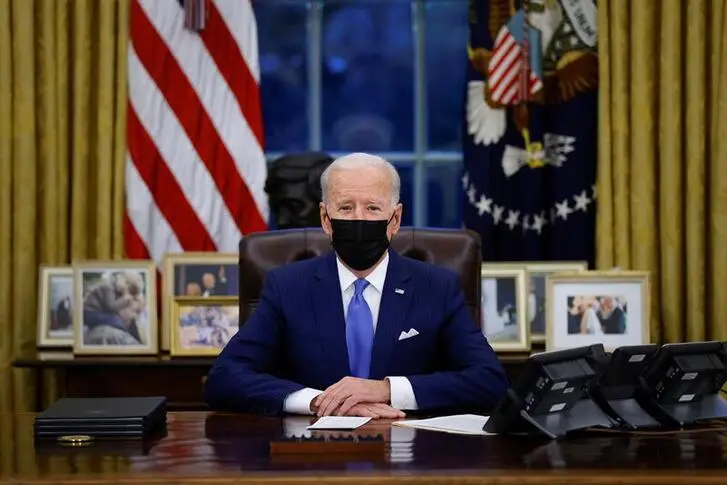PHOTO
US President Joe Biden on Monday reversed a last-minute decision by former President Donald Trump to lift aluminium tariffs on the UAE.
The White House said the US will maintain a tariff of 10 per cent on aluminium imports from the UAE.
Trump on his final day in office, January 20, issued a proclamation to exempt the UAE from the tariff on aluminium import, citing “an important security relationship,” and said a quota would suffice. The tariffs were first imposed in 2018.
Along with the UAE, tariffs on four other countries including Argentina, Australia, Canada and Mexico were also removed by Trump on his final day in office. The exemption was due to take effect on Wednesday.
Trump granted the exemption shortly after designating the UAE a “major security partner” and signing a deal to sell it 50 Lockheed Martin Corp F-35 fighter jets.
Last week, the Biden administration said it would temporarily pause that deal, and some others, to review them. An official described the pause as routine.
The White House decision late on Monday said the aluminum tariff would be more effective in protecting domestic producers than the “untested quota” announced by Trump.
“In my view, the available evidence indicates that imports from the UAE may still displace domestic production, and thereby threaten to impair our national security,” Biden said.
“I consider it is necessary and appropriate in light of our national security interests to maintain, at this time, the tariff treatment applied to aluminium article imports from the UAE,” he said.
A White House spokeswoman said the reversal of Trump’s decision should not be seen as “derogative to the close diplomatic relationship between the United States and UAE”, but was part of a broader review of the previous administration’s trade policies, including tariffs.
“President Biden’s priority is to re-establish an intelligent process for foreign policymaking and trade policy based on deliberative economic analysis and a strategy that ensures a level playing field for the American worker to compete internationally,” the spokeswoman said.
Trump first imposed the tariff in 2018 to revive idled aluminium facilities, open closed smelters and mills, and boost domestic production by cutting US reliance on foreign producers, Biden said, adding that need still existed.
He said the US Commerce Department could have granted UAE producers exemptions if it found that domestic producers were not harmed. Instead, it had denied 32 of 33 exemption requests from UAE producers before Trump’s 11th-hour decision.
Aluminium ranks as the UAE’s biggest exported good by value to the US, and the nation sold $1.3 billion worth of the metal to American buyers in 2019, according to the Office of the US Trade Representative.
The UAE-based Emirates Global Aluminium, the largest producer in the Middle East, is “monitoring the situation closely,” spokesman Simon Buerk was quoted by Bloomberg as saying.
EGA shelved plans for an initial share offering after Trump first imposed tariffs on UAE aluminium in 2018.
CRU Group, a commodity researcher, says shipments from the UAE were roughly 11.5 per cent of total US aluminium imports last year through November, and about 14 per cent in 2019. In 2019, the UAE exports accounted for about 11 per cent of all aluminium consumed in the US, according to the research group.
US data showed a drop of 25 per cent in aluminium imports from the UAE after the tariff, matched by a rise of 22 per cent in domestic aluminium production through 2019, before the coronavirus pandemic began.
Copyright © 2021 Khaleej Times. All Rights Reserved. Provided by SyndiGate Media Inc. (Syndigate.info).





















